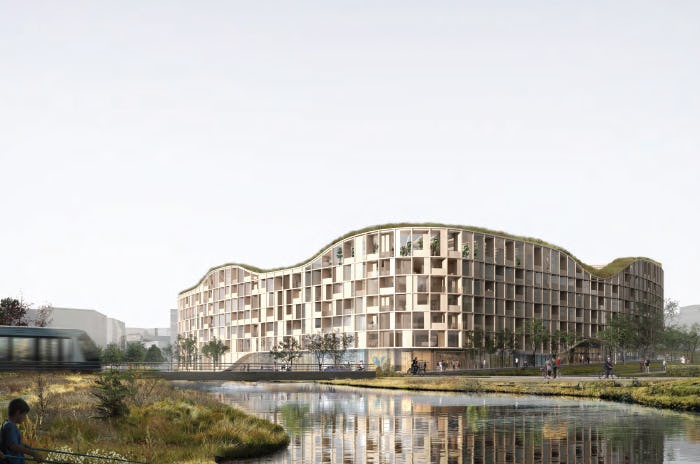Winning proposals in the C40 international competition for sustainable and environmentally friendly buildings were announced last week. EFLA, together with its collaborators, had proposals for two plots in Reykjavík (Ártún and Lágmúli) that won in the competition.
Promoting eco-design
The competition is called The Reinventing Cities – C40 and its objective is to act as a catalyst for designing and building urban areas in an eco-friendly, sustainable and carbon-neutral manner. The main focus of the project is to tackle climate change and to reduce greenhouse gas emissions by promoting innovative solutions in eco-design.
Fifteen cities around the world specified 39 plots to give building designers the opportunity to transform the area in an environmentally friendly way. The competition organizers along with co-operators invited architects, contractors, environmentalists, local groups, innovators and artists to participate and put forward their proposed solutions that transform the plots in an eco-friendly. The buildings are expected to be showcase sustainable buildings that could be duplicated in other places.
.jpg&w=2048&q=80)
The winning proposal in the Lágmúli neighbourhood puts focus on health and well-being of inhabitants and guests. Model image of the winning proposal
Three plots
Reykjavík City provided three plots: One in the Ártún neighbourhood; one by Frakkarstígur in downtown Reykjavík; and one in the Lágmúli neighbourhood close by downtown Reykjavík. EFLA was a member of two teams that put forward proposals for the plots in Ártún and Lágmúli.
Ártún – Living Landscape team
The innovative proposal focuses on eco-friendly and carbon neutral solutions to have a positive impact on the environment around it. The proposal aims to provide an ecosystem of plants, vegetation and trees in the centre of the building.
The building will be the largest timber building in Iceland and it will be certified with the BREEAM certification scheme.
Eco-design was the focus over the whole building life cycle, from selection of building materials, throughout operation and maintenance, to dismantling and waste treatment. Emphasis was put on integrating connections with the planned City Line that will lie adjacent to the plot, as well as energy efficiency and water savings.
Environmental approach was taking in the design of the building, promoting good health and well-being of the building users and its surroundings. A part of that approach was to provide a flowing mixture of green roofs and greenhouses on the top floor.
The design team Living Landscape that made the Ártún proposal consists of Jakob+Macfarlane, T.ark, EFLA Consulting Engineers, EOC, Landslag, CNRS, Klasi, Heild, Upphaf and Arnarhvoll.
.jpg&w=2048&q=80)
Living Landscape team receiving the award in Oslo.
Lágmúli – FABRIC team
The goal of the project was to create a showcase carbon-neutral building in Reykjavík city. The building will be BREEAM certified, which fits well with the city's policy. Furthermore, the criteria set out by BREEAM fit well with the design team's target of providing a carbon-neutral and energy efficient building, choosing eco-friendly building materials, and providing good connections to public transport and other environmentally friendly means of transport.
The proposal focuses on eco-design, good lighting, air quality and acoustics, limiting energy use and carbon neutrality. Apartments and public spaces are designed to provide co-living and co-sharing spaces as recommended in the local plan. The heart of the building will be a greenhouse to provide a green space for users. The vegetation of the greenhouse forms a flowing space of green out to the public space south of the building.
Emphasis is made on environmentally friendly design of the building that supports the health and wellbeing of building users. There are geothermal boreholes in use within the plot and they will serve as a platform to inform users about renewable energy production in Iceland.
The FABRIC design team is behind the proposal for Lágmúli. The FABRIC team consists of Basalt architects, EFLA Consulting Engineers, Landmótun and Reginn.
The results from the competition were presented on Wednesday last week, 22nd of May, at the Urban Future Global Conference in Oslo. Helga J. Bjarnadóttir, director of the Environment Department at EFLA, received the award on behalf of EFLA.
.jpg&w=2048&q=80)
Team FABRIC receives the award at the award ceremony in Oslo.
Model presentations for the winning proposals
The O-shape of the building provides a frame for an ecosystem with plants, vegetation and trees.
.jpg&w=2048&q=80)
Living Landscape – Ártún.
